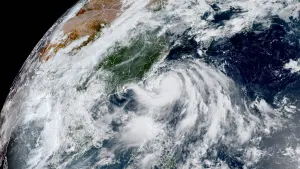
Study examines link between extreme heat and mental health
The paper is the largest of its kind to date.
Extreme heat is associated with an increased risk of emergency room visits for mental health crises, according to a recent peer-reviewed study appearing in the journal JAMA Psychiatry.
The link between heat stress and adverse physiological responses is well-documented. Between 2005 and 2010, heat-related illnesses sent nearly 100,000 people to emergency rooms in the U.S., suffering from heat cramps, heat exhaustion, and heatstroke.
But there is far less literature on the link between extreme heat and mental healt. The JAMA Psychiatry paper, conducted by a team at the Boston University (BU) School of Public Health, represents the "largest and most comprehensive analysis" on the topic to date, the study's authors say.
"We are hoping that healthcare providers can use the results of our work to prepare for increased needs for mental health services when times of extreme heat are forecasted, especially during upcoming summers as we continue to see more extreme weather due to climate change," Dr. Amruta Nori-Sarma, the study's lead and corresponding author and an assistant professor of environmental health at BU School of Public Health, tells The Weather Network via email.
"This may include for example outreach to patients about symptoms they may experience during times of extreme heat, or information on cooling centers or other resources they can access during those temperature spikes."
Dr. Nori-Sarma and her colleagues analyzed medical data on 3.5 million mental health-related emergency room visits on 2.2 million health-insured American adults aged 18 and older, between 2010 and 2019. Researchers focused on the warmer months, May to September, with participants based all over the U.S.
The team found that days of extreme heat were "most strongly" linked with emergency room visits from behavioural disorders, substance use disorders, anxiety, stress, and other conditions, including schizophrenia.
"In our study, we saw the effect of higher temperatures on the same day or up to 1-2 days later, but the strongest increase in rates of [emergency room] visits was on the same day," Dr. Nori-Sarma says.
All ages and genders appear to be equally impacted, but individuals with access to air conditioning or cooling centres are less likely to suffer adverse effects, researchers found.
LOWER RISK IN SOUTHERN STATES
There were higher rates of emergency room visits in northern latitudes when compared to southern regions, a finding Dr. Nori-Sarma calls "somewhat surprising," given the relatively warmer temperatures in the south.
"We think that this points to better adaptation in communities in the southern U.S. For example, more use of air conditioning to beat the summertime heat," she says.
POTENTIAL TO LOWER HEALTH CARE COSTS
Given the paper only includes records up to 2019, future work will likely incorporate the effects of COVID-19 lockdowns, another well-documented trigger for depression and anxiety.
The team hopes to conduct additional research to identify strategies that will educate the public about extreme heat risks, while informing health providers on how to plan ahead, alongside the weather forecast.
They also hope to determine if certain races and ethnicities are more likely to be at risk, and if there is a greater impact on uninsured or low-income patients.
“Emergency department visits represent some of the costliest interactions within the healthcare system,” Dr. Nori-Sarma says.
“Addressing the needs of the most vulnerable to preempt some of these visits can have a positive impact on individual health and costs, as well as preserve healthcare resources for other emergencies.”










